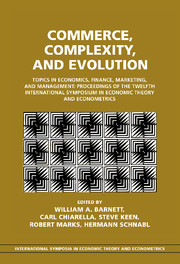 Commerce, Complexity, and Evolution
Commerce, Complexity, and Evolution Book contents
- Frontmatter
- Contents
- Series editor's preface
- Volume editors' preface
- Editors
- List of contributors
- I Philosophical and methodological implications of complexity and evolution in economic systems
- II Finance and the macroeconomy
- III Market and sectoral dynamics
- IV Marketing and interdependent behavior
- 15 A complex-systems simulation approach to evaluating plan-based and reactive trading strategies
- 16 Genetic algorithms and evolutionary games
- 17 Evolved perception and the validation of simulation models
- 18 The application of cellular-automata and agent models to network externalities in consumers' theory: a generalization-of-life game
17 - Evolved perception and the validation of simulation models
Published online by Cambridge University Press: 05 December 2011
- Frontmatter
- Contents
- Series editor's preface
- Volume editors' preface
- Editors
- List of contributors
- I Philosophical and methodological implications of complexity and evolution in economic systems
- II Finance and the macroeconomy
- III Market and sectoral dynamics
- IV Marketing and interdependent behavior
- 15 A complex-systems simulation approach to evaluating plan-based and reactive trading strategies
- 16 Genetic algorithms and evolutionary games
- 17 Evolved perception and the validation of simulation models
- 18 The application of cellular-automata and agent models to network externalities in consumers' theory: a generalization-of-life game
Summary
Economics has been a predominantly analytical discipline in its search for necessity – reducing the complex phenomena of interacting agents to interactions of one or two causes, holding all else unchanging (ceteris paribus) and then attempting to reintroduce the complexity through additivity, making the assumption of linearity. But sometimes all the king's horses and all the king's men… and nonlinearities and other complexities have stymied the search for necessity through additivity. This has led to two sorts of solutions: nonlinear dynamics, in which second-order interactions are specifically modeled, and simulations, in which the search for necessary conditions is abandoned and, rather, sufficiency is the goal. What are the consequences in the aggregate of individual agents behaving just so – what assumptions at the microlevel are sufficient for the emergence of a specific pattern of economic phenomena? There are many instances of the search for sufficient conditions elsewhere in this volume, but one aspect of this research approach has been relatively neglected: the issue of validation from historical data. In the standard analytical approach, linear regression has been used to derive coefficients in the linear relationships among a dependent variable and a set of independent (causative) variables. In general, there has been no shortage of data. With the recent approach of simulation for sufficiency, there has been little use of historical data: Data series for complex economic repeated interactions are uncommon, and anyway the nature of sufficiency – “these coefficients in this model may result in this emergent behavior” – may not be generalizable. But there is a need for greater use of historical data, both to aid in the derivation of coefficients and to help validate the models.
- Type
- Chapter
- Information
- Commerce, Complexity, and EvolutionTopics in Economics, Finance, Marketing, and Management: Proceedings of the Twelfth International Symposium in Economic Theory and Econometrics, pp. 335 - 350Publisher: Cambridge University PressPrint publication year: 2000
- 1
- Cited by


